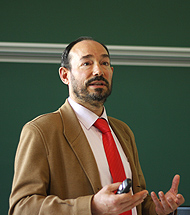"El aval estadístico de las investigaciones es prácticamente una exigencia de las revistas científicas de alto impacto"
El catedrático de Estadística Jesús López-Fidalgo explicó en un seminario del ICS cómo actúa la estadística desde la perspectiva de la posible manipulación en las distintas fases de un estudio

"El aval científico de las investigaciones es prácticamente una exigencia de las revistas científicas". Así lo indicó el catedrático de Estadística Jesús López-Fidalgo, director de la Escuela Técnica Superior de Ingenieros Industriales de la Universidad de Castilla-La Mancha, con motivo de un seminario que impartió en el Instituto Cultura y Sociedad (ICS).
En su ponencia, titulada ‘El azar no existe', explicó cómo actúa la estadística desde la perspectiva de la posible manipulación en el proceso de planificación, recogida de datos, análisis e interpretación.
"En todo el proceso hay muchos momentos en los que se puede dar algún tipo de manipulación, que puede ser intencionada o no", apuntó. En ese sentido, insistió en que en muchas ocasiones no hay una intención de engaño, sino un problema de "falta de formación en estadística o de que no se ha podido contar con el apoyo de un especialista, pues hay pocos titulados y tienen una gran demanda".
"La estadística debería ser parte de la cultura general"Como ejemplo de manipulación, mencionó que en la fase de la recogida se pueden modificar los datos o bien suprimir algunos que no encajan o resultan demasiado extremos. Con todo, recordó que la propia estadística "tiene procedimientos para detectar posibles trampas y que están basados en la belleza intrínseca de los datos reales".
Por otro lado, señaló que también puede ocurrir que se elija un tipo de análisis inadecuado, como intentar repetir un análisis realizado por unos investigadores adaptándolo a un contexto diferente en el que dicho análisis ya no es válido.
El catedrático comentó que la interpretación es quizá la fase en la que más cabe la manipulación intencionada: "Hay casos en los que los resultados estadísticos no revelan lo que los investigadores quieren, con lo que estos deciden prescindir de mencionarlos".
Por último, el profesor López-Fidalgo hizo hincapié en que el mejor modo de que la ciudadanía pueda protegerse de la manipulación de los datos es que la estadística se convierta en parte de la cultura general: "Del mismo modo que sabemos dónde nace un río o quién reinaba en un momento de la historia, los ciudadanos deberían conocer conceptos básicos de la estadística. Eso les ayudaría mucho en el día a día y les serviría para tener espíritu crítico ante las informaciones que les llegan, que a veces son muy sensacionalistas".
